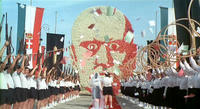 Amarcord (1974)
Amarcord (1974)So, Amarcord. I remember Amarcord being one of Bergman's favorite Fellini films, and though it's hard to explain why, it's easy to see. Both Amarcord and Bergman's best works share a very personal feel, both full of recollections and memories. I really liked Amarcord, but it's lack of cohesion holds it back from being as good as the rest of Fellini's work. It's really just a loose collection of childhood memories. Although it's really fun and not boring in the least, it lacks a sense of fullness that you get in, say, 8 1/2 or La Strada.
It's strange, all of the characters are easy to identify with. They all have a lot of basic traits, and are going through things that are universal and very relatable. Yet, they're often hard to tell apart, simply because Fellini throws a lot at you early on, and your brain isn't sure who and what to disregard as immaterial in terms of plot. There's also a big political message here that's mostly lost on me, simply because I'm not a political person, nor am I an historical person, so I'm certainly not one for politics from 30 years ago, despite how relevant they may be today. Amarcord's political message isn't so obvious that a layman like me understands it, but there's no denying it's there, so it's probably a good trait to have in the film.
The sense of wonder and recollection are extremely vivid in Amarcord, and it does a great job of transporting you into the time and place. In fact, at certain points, I could practically smell the soft breeze as a family travelled through the country. If the film even slightly resembles what actually was Fellini's youth, then it's not hard to imagine why his films are the way they are.
0 Comments:
modium
- Rhode Island, United States
- My profile
Links
Other Nerds
Previous posts
Archives
- 2005-06-26
- 2005-07-03
- 2005-07-10
- 2005-07-17
- 2005-07-24
- 2005-07-31
- 2005-08-07
- 2005-08-14
- 2005-08-21
- 2005-08-28
- 2005-09-04
- 2005-09-11
- 2005-09-18
- 2005-09-25
- 2005-10-02
- 2005-10-09
- 2005-10-16
- 2005-10-23
- 2005-11-06
- 2005-11-27
- 2006-01-29
- 2006-03-26
- 2006-04-02
- 2006-04-09
- 2006-04-30
- 2006-05-07
- 2006-05-28
- 2006-06-25
- 2006-07-09
- 2006-07-23
- 2006-08-06
- 2006-08-27
- 2006-09-03
- 2006-09-10
- 2006-09-17
- 2006-10-08
- 2006-11-19
- 2006-11-26
- 2006-12-03
- 2007-02-25
- 2007-06-17
- 2008-05-11
- 2008-05-25
- 2008-06-01
- 2008-06-22

